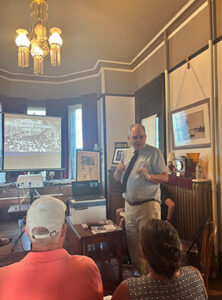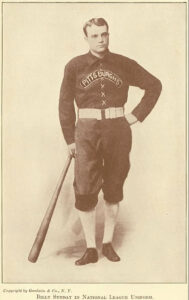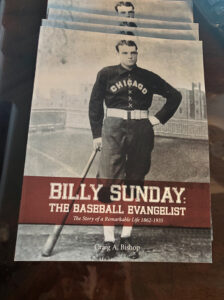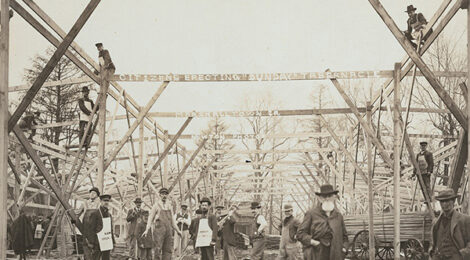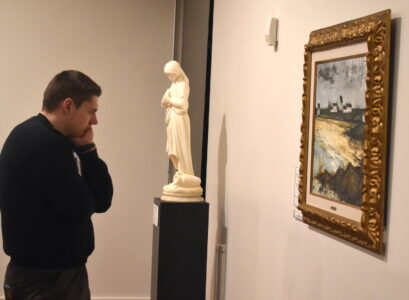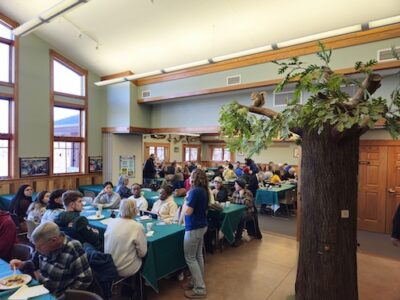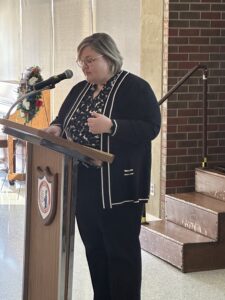History on Second Tuesday program highlights the life and times of Billy Sunday
It was a night of fire and brimstone at the Historical Society of Marshall County on Tuesday, but the fire department was never called and there was no lingering scent of smoke left hanging in the air afterwards. Minnesota native and Ames resident Craig A. Bishop came to present an updated encore presentation to his Marshalltown audience about the astounding life of William Ashley Sunday.
Sunday, of course, was once a member of our fire department here before he was recruited by Adrian “Cap” Anson to play professional baseball in Chicago. He would become known by many as the fastest man in baseball during his playing days, but he soon became a national celebrity known for his energetic and inspiring preaching of the gospel.
Historian Bishop gave an interesting and informative summary and slideshow of the life of Reverend Sunday, starting from his birth in a tiny cabin near Ames, and his time spent in Iowa orphanages during the Civil War.
Billy was born in November 1862, only a month before his bricklayer father died of pneumonia just months after he had enlisted into Company E of the 23rd Iowa Infantry. His widowed mother remarried but her new husband proved to be a drunk, completely unreliable — a man who stole her pension money and disappeared.
Sometime after Anson brought Billy to Chicago to join the White Stockings team, Sunday and some teammates were walking downtown when they encountered a group from a nearby mission house singing hymns on a street corner. They invited the ball players to join them at their chapel, but only Billy agreed to go. He was converted, and it stuck. In Chicago thereafter he often preached at the YMCA when he wasn’t playing ball.
He played for a few other teams and was offered very generous salaries. In Philadelphia, he began standing up in churches giving his emotional personal testimony, bringing tears to the eyes of his listeners. After 8 years in the major leagues, at the height of his career, he quit baseball and took up a fulltime job working for Christ. He kept at it for 39 years.
After serving in the ministry for a while under a Reverend Chapman, Billy returned to Iowa. He was married by this time and his wife Helen helped book revival meetings in opera houses in towns like Garner, Emerson, Bedford and Keokuk where he preached to packed crowds; crowds who were amazed at his eloquence and animated delivery.
He made headlines everywhere he appeared, demolishing all previous records for attendance at revival meetings. But Billy attracted enemies too, for his anti-liquor stance. Once in Springfield, Illinois, a stranger approached the stage, suddenly pulled out a bullwhip, and proceeded to lash at the young preacher. He was quickly subdued.
At each town he preached several sermons a day, often to specialized crowds: only men, only women, high school students, or factory workers, or miners, or teachers, or veterans.
In 1909, Billy came back to Marshalltown and stayed for around a month. His crowds had outgrown the smaller opera houses so he would build temporary “Tabernacles,” huge buildings that could seat several thousands of people at a time: 4 thousand, 6 thousand, even 15,000. In an era without stadiums, it was unbelievable. They were torn down and the lumber sold after Sunday left town.
The Tabernacle he had built in Marshalltown was on the corner of 3rd Street and Main. The Evening T-R kept track of attendance each day on the front page. After only a week the running total of attendees was almost 80,000. It is said he made 6,000 converts here. As a result, saloons here were closing down one by one.
In Bloomington, Ill., men climbed onto the roof hoping to see or hear Sunday preach. In Detroit, 20,000 women banged the doors to be admitted into a place already overflowing with men. In Columbus, a big snowstorm kept the vast crowd snowed in overnight inside the tabernacle. He was a smashing success in New York City.
He met Woodrow Wilson and Babe Ruth. Wilson begged Sunday not to go to Europe to preach to the soldiers overseas in WWI, because he was more needed here stateside. In Florida, when Ruth hit the longest home run ever recorded, Ruth gave the ball to the former major leaguer Sunday. His whole career was just one unending incredible event.
The Sundays settled down in Winona Lake, Ind. They had one daughter, three sons and a grandchild but, sadly, tragically, all died young, of disease, suicide, a car wreck, and a plane crash.
Billy died in November 1935, survived by his wife Helen.
At the end of his presentation, Mr. Bishop had one last trick up his sleeve, a very brief but riveting black and white film clip of Billy Sunday in full action: preaching and swinging his arms exhorting his audience to turn to Christ. Bishop then took several questions from the audience, leaving them fully satisfied. It was a great, entertaining evening.
The red mansion at 503 West Main St. still stands, having survived the brimstone.
The Historical Society of Marshall County offers new and entertaining presentations every month on the second Tuesday. All are invited to attend, there is no charge, except your time and attention.
- T-R PHOTOS BY MICHELLE ROSEBURROUGH — Craig A. Bishop, the author of “Billy Sunday: The Baseball Evangelist” gave the presentation during Tuesday night’s History on Second Tuesday event at the Mowry Irvine Mansion in Marshalltown. The monthly series is organized by the Historical Society of Marshall County (HSMC).
- Billy Sunday in uniform when he played for the Pittsburgh Alleghenys.
- Copies of “Billy Sunday: The Baseball Evangelist” were on display during Bishop’s presentation.
- The Marshalltown Tabernacle under construction in 1909.

